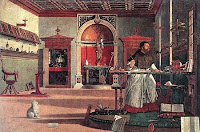Saturday, March 20, 2021
Forgive the sin that we have wrought; | Increase the good that we have sought
Prayer renders one objective
"If you were still to ask me now before I go, and finally go, whether I know of a magic key to open the final door to wisdom, I would answer you: 'Yes, indeed!' And the magic key is not reflection, as you might expect to hear from a philosopher, but prayer. [Prayer, understood as ultimate surrender, renders [one] still, renders [one] childlike, renders [one] objective. For me, a man grows deeper and deeper into the expans[iveness] of humanity (I don't mean humanism) to the extent that he is able to pray, provided only that the right [kind of] prayer is meant. Prayer characterizes all ultimate 'humility' of mind.] The great things of existence are only given to praying [minds]. [But one learns to pray best in suffering.]"
Peter Wust, Abschiedswort (18 December 1939), as translated in Peter Seewald, Benedict XVI: a life, vol. 1: youth in Nazi Germany to the Second Vatican Council, trans. Dinah Livingstone (London: Bloomsbury Continuum, 2020), 164. I have filled the Livingstone translation out on the basis of the Peter-Wust-Gesellschaft German below, translating Geist somewhat riskily as mind.
"Und wenn Sie mich nun noch fragen sollten, bevor ich jetzt gehe und endgültig gehe, ob ich nicht einen Zauberschlüssel kenne, der einem das letzte Tor zur Weisheit des Lebens erschließen könne, dann würde ich Ihnen antworten: 'Jawohl'. - Und zwar ist dieser Zauberschlüssel nicht die Reflexion, wie Sie es von einem Philosophen vielleicht erwarten möchten, sondern das Gebet. Das Gebet, als letzte Hingabe gefaßt, macht still, macht kindlich, macht objektiv. Ein Mensch wächst für mich in dem Maße immer tiefer hinein in den Raum der Humanität - nicht des Humanismus -, wie er zu beten imstande ist, wofern nur das rechte Beten gemeint ist. Gebet kennzeichnet alle letzte 'Humilitas' des Geistes. Die großen Dinge des Daseins werden nur den betenden Geistern geschenkt. Beten lernen aber kann man am besten im Leiden."
Peter Wust, Abschiedswort (18 December 1939) =Gesammelte Werke 7 (1966), 339-340, as quoted on the last page of Werner Schüßler, "Peter Wust - eine biographische Skizze," under "Biographie," under "Peter Wust," at http://www.peter-wust-gesellschaft.de/ (Peter-Wust-Gesellschaft).
Tuesday, March 16, 2021
"Sensibility to the truth"
Pope Benedict XVI, Lecture by the Holy Father Benedict XVI at the University of Rome "La Sapienza" scheduled for 17 January 2008 but undelivered. "Jürgen Habermas articulates a vast consensus of contemporary thought when he says that the legitimacy of a constitutional charter, as a basis for what is legal, derives from two sources: from the equal participation of all citizens in the political process and from the reasonable manner in which political disputes are resolved. With regard to this “reasonable manner”, he notes that it cannot simply be a fight for arithmetical majorities, but must have the character of a 'process of argumentation sensitive to the truth' (wahrheitssensibles Argumentationsverfahren). The point is well made, but it is far from easy to put it into practice politically. The representatives of that public 'process of argumentation” are – as we know – principally political parties, inasmuch as these are responsible for the formation of political will. De facto, they will always aim to achieve majorities and hence will almost inevitably attend to interests that they promise to satisfy, even though these interests are often particular and do not truly serve the whole. Sensibility to the truth is repeatedly subordinated to sensibility to interests. I find it significant that Habermas speaks of sensibility to the truth as a necessary element in the process of political argument, thereby reintroducing the concept of truth into philosophical and political debate."
Monday, March 15, 2021
God's Rotweiler
Peter Seewald, Benedict XVI: a life, vol. 1: youth in Nazi Germany to the Second Vatican Council, 1927-1965, trans. Dinah Livingstone (London: Bloomsbury, 2020), 17. Cf. p. 4. My thanks to Colin Lewis for putting me onto this (earlier) photograph, which I have not, however, authenticated. Ratzinger was just over two when the family left Marktl for Tittmoning.
"The professor went on excursions with his students and invited them to supper. 'There was an old-fashioned sofa in his living room with a teddy bear,' Roman Angulanza recalled. 'Ratzinger went up to it and said: 'May I introduce you: Teddy, this is Mr Angulanza. Mr Angulanza, this is my Teddy, who has been with me since my childhood days.' Then all my nervousness was blown away" (322).
Sunday, March 14, 2021
"But what shall men do who cannot find anything wise to say, because they are interpreting foolish things?"
St. Augustine, City of God VII.19, trans. Dods =CSEL 40.1, p. 328, ll. 19-20.
"here a man is so mutilated that he is neither changed into a woman nor remains a man."
"hic ita amputatur uirilitas, ut nec conuertatur in feminam nec uir relinquatur."
St. Augustine on "the famous mysteries of Tellus and the Great Mother," City of God VII.24, trans. Dods =CSEL 40.1, p. 338, ll. 5-6.




